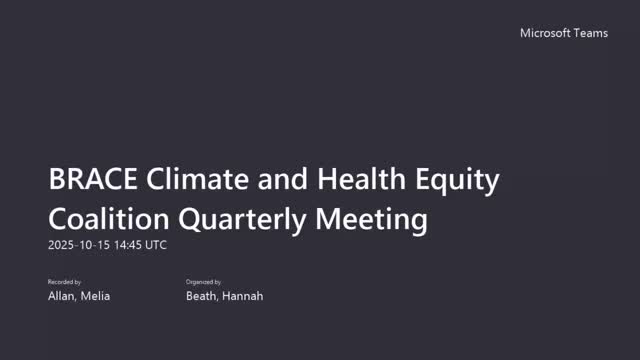Connecticut DPH secures final-year BRACE funding; mini-grants, staffing and symposium face compressed timelines
Get AI-powered insights, summaries, and transcripts
Subscribe
Summary
The Department of Public Health received a notice of award for the final year of its BRACE grant, reopening work on two adaptation actions but leaving staffing, contracting and longer-term funding uncertain.
The Department of Public Health received a notice of award for the final year of its BRACE grant, reopening work on two adaptation actions but leaving staffing, contracting and longer-term funding uncertain.
The award, which Hannah Beath, Department of Public Health (DPH) staff, said arrived in September, secures funding for Beath’s position and a portion of another staffer’s time and restores the agency’s ability to spend on climate-and-health activities that had been frozen since January. "We did receive our notice of award for BRACE grant funding for our final year," Beath said, adding the award allows the office to resume previously paused work.
The BRACE grant covers two principal adaptation actions. One, led by DPH, was originally scoped as a Connecticut-specific curriculum for local health departments; the other, led by the Yale Center on Climate Change and Health, awards four mini grants for local heat and air-quality planning.
Why it matters: DPH froze BRACE-related funds in January out of concern that spending could be clawed back if federal circumstances changed. Releasing those funds now lets the state resume planned activities but on a compressed timeline: the award period runs through Aug. 31, 2026, leaving less than a year to complete deliverables and report outcomes.
Most immediate work and constraints
Beath said DPH will prioritize preserving the data-collection and analysis elements of the DPH-led action even if the originally planned new curriculum proves redundant in the post-pandemic training landscape. She noted that national resources — including a climate-and-health training kit from the American Public Health Association and state-level materials — already exist and that DPH may instead focus on sharing Connecticut-specific analyses and datasets.
On the Yale-led action, Beath said the center will provide technical assistance while awarding $24,500 in mini grants to each of four selected local health departments for local heat and air-quality planning. "Contracts are in the pipeline," she said, and Yale’s existing template and webinars should speed onboarding. Beath warned, however, that contracting delays and the condensed schedule mean the partners are "a bit pinched with the timeline."
Staffing and fellowship uncertainty
Beath said the DPH Office of Climate and Health remains effectively a one-person office. A staff member previously hired full time left due to funding volatility and DPH is not clear on reposting. Separately, a fellowship originally funded through the office of public health workforce development shifted from an environmental-justice focus to adaptation and resiliency when embedded in DPH; the contracting partner at Southern Connecticut State University (SCSU) has faced funding constraints and the fellowship’s timeline is uncertain. Beath said DPH will consider alternative uses for those funds but did not announce a decision.
Symposium debrief and planning for 2026
Jen (Yale Center on Climate Change and Health) led a debrief of a recent symposium that combined scientific presentations, community panels and poster sessions. She said about 80 people attended in person and roughly 80 attended online; response to the post-event survey was limited. Panels covered climate hazards, populations at risk, and local solutions; presenters named in the program included Jim O’Donnell and Mark Devas (CIRCA), Kai Chen (Yale Center on Climate Change and Health), and Sharon Lewis (Connecticut Coalition for Economic and Environmental Justice). Survey respondents praised lived-experience presentations and technical epidemiology talks and asked for more time for networking and practical discussion of community-level projects.
Organizers are planning a 2026 symposium before the BRACE grant ends. Because the grant forbids spending on venue rental, organizers are seeking low- or no-cost locations (public schools, community colleges, the Hartford Times Building and university spaces were discussed) and trying to balance accessibility, catering and transit. Beath and Jen said they may seek modest outside funding or in-kind support to cover costs such as food and parking to avoid shifting the burden to grantees.
Community engagement and equity focus
Yale and DPH emphasized that the mini grants and local planning must center community voices. Jen said community engagement and lived-experience perspectives were explicit review criteria for the mini grants and will shape how local heat and air-quality planning proceeds.
What was not decided
There were no formal votes or binding decisions recorded during the update. Key uncertainties remain: whether the DPH-led curriculum project will proceed in full, the final form and staffing for the proposed fellowship, the speed of contracting for the Yale mini grants, and what funding pathways will be available beyond the current BRACE award.
Next steps and timeline
Beath said DPH and Yale will continue contracting work for the mini grants and will consult with CDC staff as the shutdown that had delayed federal conversations resolves. Organizers plan outreach about symposium venues and speaker suggestions and expect to revisit planning at the coalition’s next meeting, scheduled for Jan. 21. DPH and Yale staff encouraged coalition members to share venue leads, funding ideas and candidate presenters.
Ending
Coalition members offered practical suggestions during the meeting — from hosting at public schools or community colleges to engaging legislators or producing a short report for state lawmakers — while organizers pledged follow-up on contracting and venue leads. The BRACE NOA restores near-term activity but leaves longer-term staffing, contracting and funding questions unresolved.
